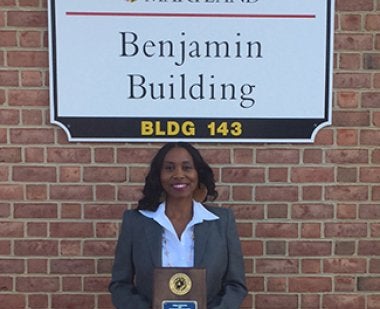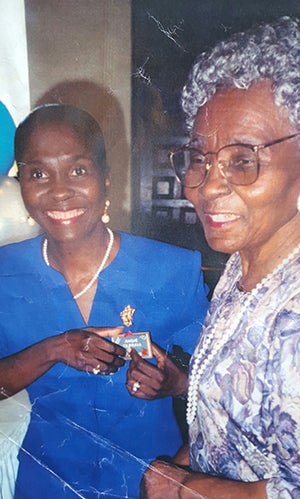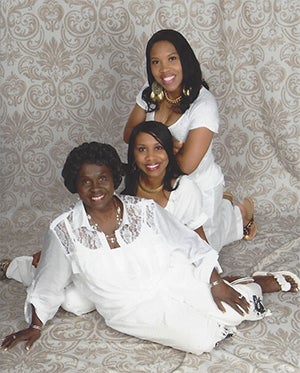
“Professor,” “teacher,” and “educator” are very meaningful words for my family. I am a fourth generation educator.
When I was in elementary school, my grandmother would take me along to assist her with adult literacy at a local community center. At first, because I was a child, her students were resistant and perhaps also embarrassed. With my grandmother’s direction and guidance, however, I was soon accepted by the emergent adult readers and started reading with them. The strategies that we used paralleled those of the late literacy researcher and clinical psychologist Marie Clay of New Zealand. For instance, we matched voice to print, turned books around in the right order, and identified letters and symbols with our reading group. Little did I know I would later learn and teach some of these strategies in literacy classes at the postsecondary level.
My grandmother Charlotte had by then retired after forty years of service as a teacher in Florida’s public schools, finishing her career at A. Quinn Jones Elementary School in Gainesville, Florida. She is a testament to the conviction that some people receive an extra chance to be here. According to my great aunt Charity, the local midwife declared my grandmother stillborn. Devastated, the family placed her in a coffee can – it was customary, for that time, culture, race, and region, to bury stillborn children in coffee cans. But my grandmother started crying as soon as she was put in that can, and then she lived for 88 more years! My grandmother’s older sister Charity gave her the nickname “Hon” because she was born with skin the color of honey.
Hon dedicated her life to teaching. She taught pre-kindergarten, elementary school, and adults. I was a toddler when I started going to work with her in a Pre-Kindergarten Center, and the immersion in such a print-rich environment catalyzed my literacy skills. My parents maintain that I was crawling to words on the floor, as part of an identification game, months before I was even walking. Even after Hon retired, her work in education continued.
Hon’s father – my great-grandfather – was John Wiley Franklin Webb, Sr., born to Wiley and Charity Webb in 1861. He was known as Professor Webb. He and my great-grandmother, Mary Lena Mitchell, lived in Early County, on Georgia’s southwest border with Alabama. Professor Webb taught in the late 19th century at one of the first schools in West Georgia for people of color. It was the only school in the town, and he was the principal. Located just 5 miles from the Alabama border, the school attracted students from far and wide. There were ten Webb children; seven survived. The Webb children were Charlie Mae Harris (b. 1902), Charity Rochelle Moore (b. 1903), Fannie Delilah Powell (b. 1905), Clora Ellen Pridgeon (b. 1906), Charlotte Matilda Robinson (b. 1910), John Wiley Webb, Jr. (b. 1911), and Julia Zenobia Smith (b. 1921).
All the Webb children had to teach for at least one year at my grandfather’s school after graduating, they all married and had their own families, and three – Charlotte, Charity, and Charlie Mae – attended 4-year colleges to become educators. Charlie Mae, the firstborn, taught in Georgia for more than 40 years. Charlie Mae Harris was such an inspiration that five of her own children went on to become educators. Her son John was the principal of the local high school in Early County, Georgia. Her daughters Annette and Nellie also taught in southern Georgia. And two other daughters taught in Washington, D.C. Her youngest daughter Ruth taught Business Education at Pinecrest High School, and her oldest daughter, Mary Ellen, was a Special Educator at John Tyler Elementary School.

The second-born of the Webb children, Charity, worked as a school librarian for more than thirty years. She and Uncle George and their son Daniel lived in the town of Lake Butler in central Florida. Their red brick house stood approximately 100 yards from Lake Butler Elementary School, where she was the librarian.
Aunt Charity was known for her vocabulary, diction, and articulation in every conversation. In my family, when we were asked our name, Aunt Charity taught us to say both our first and last names. We could not use simple words; we always had to “upgrade” to a multisyllabic synonym. We had to remember when to appropriately use “between” instead of “among.” And we could not say that we “loved” any inanimate object, including food; for instance, I used to say that I loved macaroni and cheese, and Aunt Charity would explain that it was either “like” or I had to find a synonym. My friends were also drilled in grammar and pronunciation. For instance, my friend at Sunday School would say “git,” as many southerners do. She was reprimanded quickly and repeatedly made to say “get.” Aunt Charity was my first means of understanding code-switching and bidialectalism.
Some Webb children chose other professions, but in many cases their children chose education. Fannie’s daughter Katherine and son Calvin taught in Georgia. Ellen’s grandson Izell, a high school principal, was inducted into the Educators’ Hall of Fame in Taylor County, Florida. Julia, the youngest Webb, was a library instructor after high school, and her son Tommy teaches in Chesapeake, Virginia. We consistently revisit our history and organize a memorial honoring our forefathers during our biennial family reunions. My generation is in charge of them now and we coordinated one this summer in Cocoa Beach, Florida. Prior to us, my mother and her first cousins spearheaded the Webb family reunions throughout the 1990s.
My mother Angela, nicknamed “Angel,” followed in my grandmother’s footsteps, becoming an educator. She loved teaching so much that she came out of retirement as a music and fine arts educator to raise the state-level test scores at the school where she met my father. They met across the hall from each other while teaching at Duval Elementary School in Gainesville, Florida.
My mother inspired my love for music and art. She made sure both my sister and I were enrolled in music and art classes. We were involved in the University of Florida’s art and theatre programs, helping to put on productions like Porgy and Bess and Grease. I watched my mother integrate music with other content areas, as kids who were removed from their main teacher’s classroom were sent to her class. I never understood how that happened – how her classroom was filled with other teacher’s kids – until I too became that kind of teacher, one whose classroom was filled with students from all around the school.
My father, Frank Terrell, inspired my love for inquiry and science. While my mother oversaw our piano and violin lessons, my dad encouraged us to watch the Discovery and History channels. I remember his influence on young men at my middle school: he was not only a leader but a father-figure to my friends. I wanted to be that kind of inspiration to others, and I thought I could enact change by being a teacher. My father teaches non-stop; even his regular conversations are lessons. He was my guide to understanding animals and plants, and he also inspired my interest in the human body, as he had attended medical school while serving in the United States Army internationally. My parents are still married after 43 years, and they are both still involved in tutoring and teaching part-time. They are a true inspiration to my wonderful husband and to me.

In elementary school, my mother was my teacher from Kindergarten to fifth grade. In middle school, my father was an administrator. Although they are semi-retired, they have left big shoes for my sister Brandi and me to fill. An educator also, Brandi has recently been promoted in the Georgia School System. My sister’s work as an educator in the state of Georgia is poignant for our family; Georgia is where teaching as a legacy began for us. Because teaching has been a part of my family for a very long time, I feel compelled to carry the torch that was passed down from my ancestors to the next generation.
Having earned an undergraduate degree in biology at Florida A & M University, I was strongly interested in chemistry and began seeking research in toxicology at the graduate level, but education won me over. Prince George’s County Public Schools recruited me. I took Praxis exams in biology and chemistry and started teaching middle school science.
I taught at the middle-grades level for three years and followed my students until they graduated from high school. There are even a few students whom I taught at Buck Lodge Middle School, at High Point High School, and in the MCERT program which I now direct at the University of Maryland, College Park. I have known these students since they were twelve years old, and now they are educators. They too are part of my family’s legacy.
Ebony Terrell Shockley (Ph.D. Curriculum and Instruction ’12) is the director of the Maryland Master of Education with Certification (MCERT) program, director of the Office of Teacher and Leader Education (OTLE), and a clinical assistant professor in the Department of Teaching and Learning, Policy and Leadership. She is a researcher in minority and urban education, focusing on disciplinary and digital literacy (particularly in secondary science education), sociolinguistics and dialect education, and cultural factors affecting student outcomes on formal and informal assessments. Dr. Shockley is the author of The Pilot (BookSurge, 2008), a children’s book that offers a glimpse of New York City in the aftermath of September 11th.



